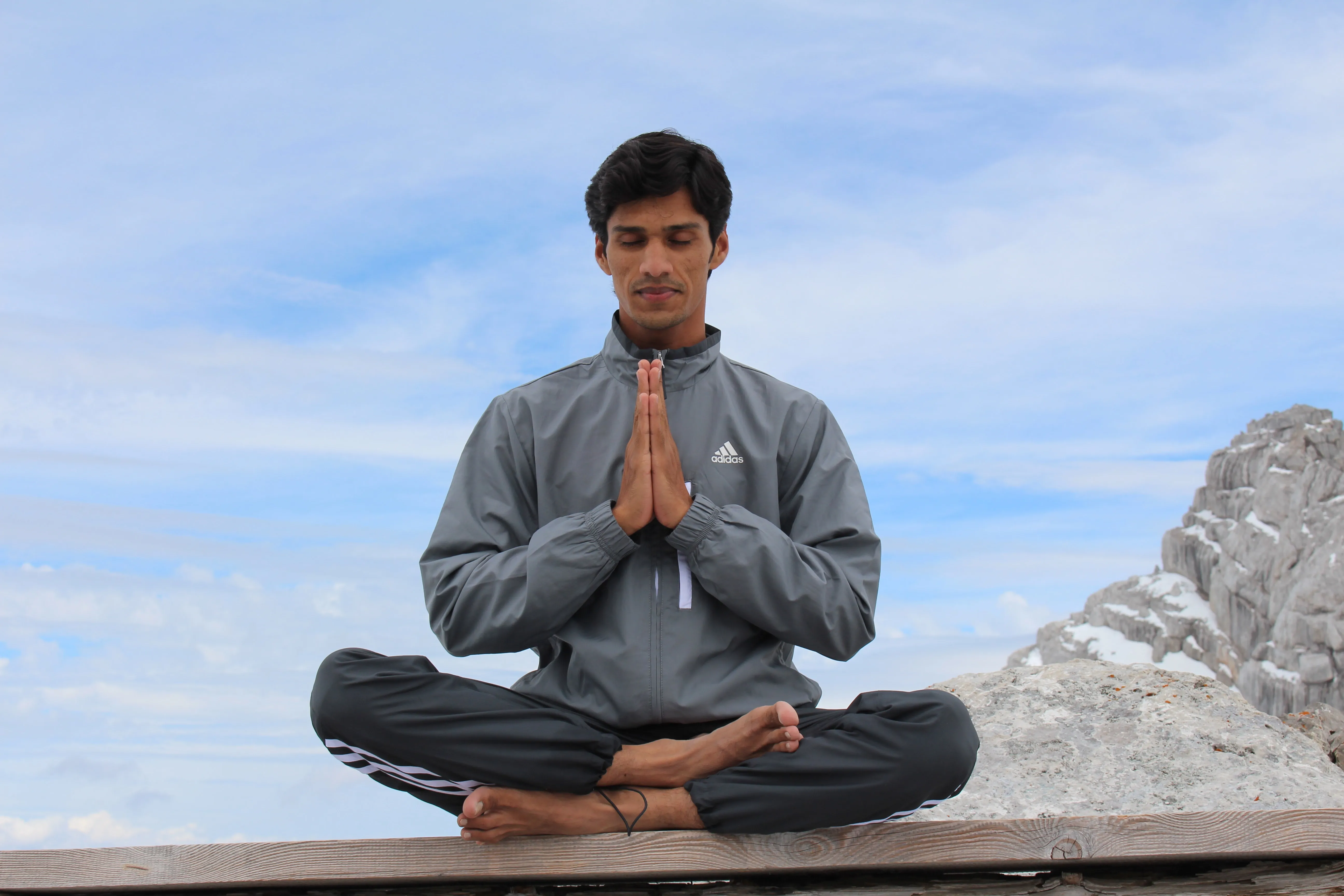7 Reasons Why Successful People Meditate
Success Through Meditation
Meditation is often dismissed as a spiritual path that only works for certain religions.
However, meditation has many positive benefits for personal and professional growth.
There is no better tool for getting what you want - SUCCESS!
With a daily meditation routine, you can improve your life, understand yourself better, and achieve more.
Among the many benefits are:
Better focus and concentration
Meditation helps improve your focus, so you'll be able to get more done in a shorter amount of time.
Being present
You are more in the present when you are not thinking about past problems or future problems. Instead, you are paying attention to what you are doing now and creating an action plan accordingly.
Problem-solving skills improved
In order to become successful, you need to learn to solve problems holistically. This will allow you to see the problem as a whole, rather than part of it.
Awareness of one's self
Learning meditation can help you live a happier and healthier life.
A reduction in tension and stress
It is one of the worst ailments in life. Reducing your tension and stress levels will allow you to accomplish more during the day.
Improved relationships
The more you know yourself, the better you can relate to others. You can become a more accepting and helpful person.
A greater sense of enjoyment and enthusiasm for life
You can maintain balance in your life by practicing meditation. Learning to manage your limitations increases your happiness.
Meditating will not only make your life more fulfilling, but will also result in greater success in your professional and personal life.
Meditation Helps You Handle Daily Stress Better
Throughout the day, your brain accumulates a lot of unnecessary information, which you can clear away using meditation.
Every day, we are faced with stress in one form or another, whether it's a daily pressure or an overwhelming situation. Stress can be categorized as a supply and demand of emotion.
Whether the stressor is real or only perceived, what matters is that you feel responsible to respond. All you need to do is create a space in your emotions regardless of whether you need to respond.
How does meditation help with stress management?
By meditating, you can make room in your mind for analyzing the stresses of every day and determining which require our attention most. Plus, you will feel calm and relaxed for the rest of the day.
Imagine if you had the space and calm to distinguish between the necessary and the unnecessary – your stress levels would be greatly reduced. Meditation will give you that space and calmness, covering the demand portion. Unfortunately, most people do not have the space or calmness in their minds.
Meditation provides the supply portion. As your minds become more elastic, it is more capable of adapting to daily stressors. With more mental resources, you become more able to handle it.
When it comes to stress prevention, how does meditation help?
By meditating regularly, you will be able to create a baseline for stress, which in turn will allow you to stay in control during stressful situations.
There are many stressful events in life, including the loss of a loved one, divorce, and moving on. These all demand a lot of you, but with meditation you can prepare yourself for them better. Meditation will even calm your inner peace because you can better process your emotions.
In meditation, you eliminate stress by creating more mental space, so you are less stressed by deciding which stressors require your attention; you have more mental resources to deal with them, and you are better able to handle them when they arise.
Efficiency and productivity are increased through meditation
While multitasking may seem like a great way to manage your hectic life, doing several tasks at once may not be the best way to handle them.
A daily practice of meditation improves your mental facilities, creativity, focus, relaxation, and concentration. You will find that focusing on one thing at a time allows you to accomplish more.
Improved creativity
Practicing meditation will increase your creativity by eliminating stress and increasing your intuition. By doing so, you'll be able to solve problems more effectively by releasing your creative energy.
Is fatigue affecting you?
When you are fatigued, you are unable to concentrate and do your best. Meditation on the other hand can energize your body and refresh your senses.
It would be wonderful to end each day with a sense of accomplishment? By practicing meditation, you can ward off fatigue and feel accomplished at the end of the day.
Stress and fatigue are also great enablers of procrastination. Eliminating them will make you much more productive every day.
Improve your efficiency
With a clear and energized mind, you can take a fresh look at things, which will allow you to work more efficiently since you will be able to see other options.
Meditation Improves Brain Functions and Elasticity
Several studies have examined how meditation affects your brain, but one fact that keeps coming up is the fact that meditation has a positive impact on the fundamental functioning of your brain.
It has been shown that regular meditation has many neurological benefits, the most notable of which is that the connections between the different brain regions become more active.
You will age slower if your brain is more connected. As the brain ages, it loses its flexibility, the part that allows it to adapt to high-stress situations.
Your brain slows down
While it may seem counterproductive to slow your brain down, your brain is able to process information more efficiently, so you are able to perform anything with peak concentration, focus, and creativity.
In general, the more elastic your brain is, the better you can perform high-stress activities and everyday activities. You can think through situations and process them in a way that others cannot.
Furthermore, meditation improves your memory. As the brain ages, it becomes less able to retain information. However, by practicing meditation, you can maintain your memory, if not improve it.
Anxiety and depression can be reduced through meditation
It has been proven that meditation also reduces anxiety and depression and can help manage many health issues.
Practicing meditation trains your brain to stay present. The brain is prone to jumping to the future or the past all too often, which can lead to anxiety and depression.
Rather than focusing on past regrets and future anxiety, meditation aims to maintain your connection with your body while stopping your mind from wandering.
Dr. Hoge's study included in the JAMA Internal Medicine review demonstrated that meditation-based stress reduction helped eliminate anxiety symptoms in patients with generalized anxiety disorder.
Getting your mind in a calm state will allow you to reduce, if not eliminate, any anxiety you may have. Considering that meditation helps highly-successful people tremendously in both their personal and professional lives, it's no surprise that they practice it regularly.
What are some ways you use meditation to reduce depression?
In order to reduce depression and anxiety, you need to meditate. You can do it almost anywhere and it will help you instantly.
Put yourself in a quiet place without any distractions. Remain focused on your breath. Thoughts will pop up, but you shouldn't force them out. Instead, embrace them.
Whenever you find yourself frustrated or stuck while working on a tough assignment, try focusing on your breath instead.
You shouldn't get frustrated with the thoughts that come. Instead, you should accept them as they are without getting frustrated.
This will take time and practice, but the more you do it, the more you will discover that you are able to calmly handle any situation. You want to create distance between your negative thoughts and your reactions.
The idea is to respond rationally and creatively rather than emotionally. Negative reactions keep you from succeeding.
Helps You Fight Disease and Stay Healthier
Keeping your mind and body healthy plays a huge role in your physical health, especially today when people have become more health-conscious. Being healthy is about more than just a good diet and exercise program.
The benefits of meditation for the body's overall health may be one of the greatest reasons why successful people meditate.
A meditation practice increases immunity, improves emotional balance, promotes fertility, relieves stomach and intestinal issues, lowers blood pressure, reduces inflammation, and increases your calmness.
Immunity is boosted

When you relax, your body can build up its immunity to tumors and viruses. Studies have shown that daily relaxation through meditation can reduce breast cancer risk.
Emotional Balance Improved
Mediation may not remove all past emotional trauma; it can certainly reduce it, prevent further trauma, and help you break through emotional barriers. If you meditate regularly, you will be able to cope with stress more easily.
Enhances fertility
Meditation can help men and women balance their hormones in the event of infertility, one of the biggest stressors preventing successful fertility.
Maintains a healthy digestive system
The practice of meditation may ease constipation, bloating, and diarrhea. It may also prevent heartburn and acid reflux.
Reduces blood pressure
With meditation, you can decrease your blood pressure by improving the body's ability to react to stressful events. Instead of worrying about the next stressful event, you can focus on your current goals.
Reduces Inflammation
The effects of stress on the body are numerous - including inflammation, heart disease, asthma, psoriasis, and arthritis. Reducing the inflammation caused by stress will help you and your whole body feel better.
Enhanced Calmness

Having a calm state of mind at all times is key to success. Meditation can make you calmer and reduce blood pressure, inflammation, and increase your calmness.
Improved Weight Management
The power of meditation for weight loss lies in its ability to connect the conscious mind with the unconscious mind. Weight fluctuation is primarily determined by the unconscious mind's reactions.
The unconscious mind plays a major role in your health, including your weight. It determines whether you reach for unhealthy foods or whether you control your cravings.
It is important for your success to eat a healthy diet. You will be able to stay focused, concentrate, have more energy, avoid fatigue, and prioritize your day better if you eat well.
Stress is one of the biggest factors in making bad choices when it comes to food and fitness. Reducing stress levels can help you make better food and fitness choices.
Think about this – even if you are making good choices, the stress itself will hold the weight on your body. Yes, that’s right. Stress itself loves fat.
Dieting and exercise without success? Check out the stress in your life. It is the primary driver of weight gain and preventative of weight loss.
You can manage your weight better by releasing stress through meditation.
Getting better sleep
People commonly believe that they can accomplish more if they sleep less. In reality, they accomplish less. If you sleep more, you can accomplish more.
It is impossible for your body to function properly if you do not get seven hours of sleep a night. You may feel you are accomplishing more, but your body is moving slower, thinking slower, has less creativity, and can't optimize your workflow despite moving slower, thinking slower, and having less creativity.
Stop feeling guilty about sleeping. You will perform better when you get adequate sleep. Aim for between seven and nine hours of sleep every night to avoid any side effects of sleep deprivation.
Success comes from learning, and successful people know this because they get the sleep they need to learn new things.
Your brain needs sleep so that it can process all that new information so that you can use it efficiently. When you are tired, your body doesn't want to keep on taking in more information. It wants to rest. Sleep helps your brain process all that new information.
In addition, your body will be able to recall information more quickly when you are sleeping enough.
Then you can apply the new knowledge to your work, become more creative, become more organized, and achieve more.
A second benefit of sleep is that it can help you avoid making mistakes, especially if you are performing tasks or making important decisions. When a task is performed incorrectly, it can cause a lot of pain and frustration. You have to spend more time and effort to rectify an error than to perform that task just once.
Sleep and meditation
Getting better sleep can be achieved by meditation in the morning or at night.
Once your body can relax, it can easily switch into relaxation mode at any time throughout the day. In other words, meditation can help prevent chronic insomnia. With the stress and anxiety reduced, your body can relax into a deep, optimal sleep.
Stress: How Do You Turn It Off?

You allow yourself to relax.
The following techniques can be used throughout your day to help you turn off the stress.
Do a body scan
Observe how your body feels from head to toe. Make note of any tension, relaxation, or anxiety you feel.
Next, relax each part of your body, starting at your toes and working backwards. Let each one fully relax before moving to the next.
Focus more on your breathing

Spend several moments throughout the day focusing on your breathing. Take 3-5 deep inhalations and exhalations.
Whenever your thoughts begin to wander, return your focus to your breathing. Repeat this process 2-3 times.
Use visualization or guided imagery
Both will have your focus on a scenario in your mind. You may choose to visualize yourself completing tasks during the day and how successful you feel at the end. Or you can imagine how you will spend your next day off. Take note of all the little details no matter what you choose.
There are many audios available online and offline if you choose guided imagery.
Quick and Easy Meditation You Can Use Every Day
Meditation helps people be successful because it increases focus, concentration, creativity, and awareness. You will experience stress instead if you don't meditate.
If you think meditation is overwhelming, it is not. The following steps will help you start meditating every day.
Step 1: Find a quiet place without distractions
While you meditate, you shouldn't be interrupted. Make sure you have an area where you can sit or lay down, whichever is more comfortable for you. Make sure you won't be distracted for five to thirty minutes.
Sitting in a chair, lying down, or lying cross-legged on the floor are all acceptable. Let your hands fall where they are comfortable. Find a position that you can remain in without moving.
Step 2: Get in the moment
Keep your attention on the present. Take note of your surroundings. Notice your senses - what do you hear, what do you smell, what do you taste, what do you see?
Pay attention to where your thoughts want to take you and come back to the present moment. Notice if there is tension in your body and where it is located.
Step 3: Concentrate on your breathing
You do not have to count your exhalations or inhalations, but if it helps you can count to three or five. Breathe through your nose.
Whenever you find your mind wandering, simply return your focus to your breathing.
Step 4: Notice your body relaxing
It may be best to begin by relaxing your toes and work your way up to your head. Your body will begin to relax.
You want to exhale all the stress you have built up in your body as you focus on each body part.
Step 5: Practice makes perfect
Initially, it might feel strange. Keep at it. Practice each day for 5 – 30 minutes. Start with five, then ten, then fifteen.
Don't worry about getting it perfect - this is just for you so that you develop a success habit.
Here are some other easy meditation techniques
Some people are not ready to sit down and meditate. Others may not feel that is right for them. There are other methods of meditating that don't require sitting.
Walking Meditation
Similarly to the meditation guide in the previous section, you can try walking meditation, but instead of sitting you will be walking. You should choose a safe location to walk.
As you focus on your breath and steps, you should avoid walking in a busy area.
To recharge your energy for the rest of the day, walking meditation is a great lunch break activity.
You should concentrate on your foot as you walk. Feel how the heel touches the ground, rolls up to the toe, and lifts in the air, before touching the ground. Feel the sensation of taking a step throughout your whole body.
Remember - even with this technique, your thoughts will wander - keep bringing them back to what's in front of you.
Interesting Experiences
We all have those unexpected moments in our lives. They make us feel great since our brain is not focusing on the chaos around us.
It stops to enjoy the moment.
You can create these experiences by taking a few minutes after work to leave work behind and prepare yourself for the journey ahead.
Act like you have not seen your family in months. Let them know how much you love them and make them feel as though nothing has changed.
It is also helpful to try to focus entirely on one person during the day and not on your pending to-do list. For example, when someone in line starts talking to you at the store, focus on them and not on your current to-do list.
Talk to a co-worker about something that isn't work-related and enjoy the moment. Don't focus on anything else.
By giving your brain a break from the chaos of daily life, these scenarios allow you to enjoy the present moment.
Activities to show gratitude

The other way to relax your body is to keep your focus on the good things in your life, such as what you've accomplished today, yesterday, this week, this month, and this year.
Your daily gratitude can be written in a gratitude journal. You can share it with a friend or family member every day, or you can hold family meetings to share your successes every day.
Taking note of your success and happiness only helps you grow.
How Do I Become More Successful with Meditation?
By integrating meditation into your daily life, you can become more successful and live a healthier, less stressful existence.
To become more successful, it's important to reduce your stress level so that you're able to concentrate, be more creative, be healthier, and have more energy.
Meditation Is Not Ancient Anymore
The practice of meditation is no longer an ancient religious tradition you read about in history books. It has become a modern tool for self-awareness, self-growth, and awareness of the world around us.
It has helped thousands become more successful.
It is possible to achieve your life's purpose and become more successful by developing a meditation practice.
- Meditation should be incorporated into all aspects of your life. Your meditation should complement your lifestyle.
2. Until you are able to master this new technique for success, you will need to remain committed. Practice every day knowing that you will get better.
3. Focus on your purpose. Know why you need to learn meditation and keep that in mind as you learn.
4. Let meditation become a part of your daily routine. Don't feel like you have to do it the same way every day. Allow yourself to learn from the process.
5. Maintain your connection to your feelings and emotions. The best meditation practice occurs when you feel through your senses.
Meditation for Success
Identify your goals and use meditation to help you reach them. Successful people around the globe use meditation to help them succeed.
Establish what, when, why, and how you wish to start your practice – plan it – and begin.
Once you understand the basic techniques of meditation, you will see improvements throughout your life once you begin practicing it.
Even if you're not 100% ready, you can start in some way.
A five-minute practice in the morning or evening is a good starting point. From there, you can add time.

